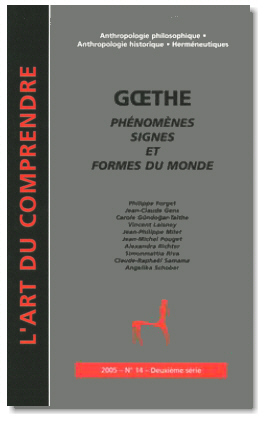
|
Monument of european Letters, Goethe is insufficiently known as for the substance of his thought. This one has however strongly irrigated his time and influenced european spirit. Hegel, Nietzsche, Marx, Dilthey, Valéry, among others, read him with fervour.
Our purpose here is to rectify an oversight, recognize Goethe through his questioning and see how much the thinker can still enlighten a modern reflection about the world as an alive and productive whole.
Inheriting from Lucrece, Petrarqua, Bruno or Spinoza and the Age of Enlighenment, being sentient at the contrasted dynamics of reality, Goethe's thought works with the aim to understand world presence the closest to phenomena. Breaking off with the overhang of transcendences it proposes to follow events through their genesis, as birth, growth and spreading out.
Turning his attention to budding of nature forms, to any sign which expresses the life force, Goethe's method tries to unify all knowledge fields into a never achieved, torn and without cease metamorphosing totality. Taken into such a game, human existence has to answer by work or creation. Nature, history, politics and societies are like signs adressed to man who has to elaborate an ethics of excellency and build the poem of harmony.
This book wished to explore the polyvalent genius of Goethe, confronted with human, explaining himself with what is coming or being produced without end and of whom it is needed to raise actively the Form. The anthropologic stakes that are concerned with Faust's author keep all their strength facing this era of the expanding technical world.
SUMMARY
- From classification of plants to an ethics of knowledge :
a goethean lesson
by Simonmattia Riva
- Types and metamorphosis, time and autonomy of living organisms
by Jean-Michel Pouget
- The Bourgeois figure in Goethe
by Philippe Forget
- Goethe and Dilthey's foundation of sciences of the mind
by Jean-Claude Gens
- The incomplete words
by Jean-Philippe Milet
- Signs and miracles in The elective affinities
by Alexandra Richter
- "Our master in critics".Sainte-Beuve and Goethe
by Vincent Laisney
- Goethe between Orient and Occident
by Angelika Schober
- Why do I like Goethe ? Or a prelude to a " Goethe's loving dictionary"
by Carole Gündog¢ar-Taithe
- Gœthe - Spiritual Miniature
by Claude-Raphaël Samama
|
The Authors
This part, at the moment, can only be read in French
- Philippe Forget est philosophe et ancien chercheur en science politique de l'Institut universitaire européen de Florence. Il a publié de nombreux travaux d'anthropologie philosophique sur le thème des rapports de l'homme à son monde à travers la technique, dont L'homme machinal, en collaboration avec G. Polycarpe (Paris, Syros, 1990) et toujours avec G. Polycarpe, Le réseau et l'infini (Paris, Economica, 1997)
- Jean-Claude Gens est maître de conférences à l'université de Bourgogne. Il est l'auteur, entre autres, d'une biographie intellectuelle, intitulée Jaspers (Paris, Bayard, 2003), et d'une traduction commentée des Conférences de Cassel de Heidegger et de la Correspondance Dilthey-Husserl (Paris, Vrin, 2003)
- Carole Gündog¢ar-Taithe est professeur agrégé d'allemand. Elle est l'auteur avec Claude Roëls de la petite anthologie, La poésie allemande (Paris, Mango jeunesse, 2003). Elle a traduit en français Le rapport secret sur le poète Gœthe, de Rafik Schami et Uwe-Michaël Gutzschhahn (Paris, Autrement Littératures, 2003), et Mon papa a peur des étrangers de Rafik Schami et Ole Könnecke (Paris, La joie de lire, 2004).
- Vincent Laisney est enseignant-chercheur en Lettres modernes (CNRS), spécialiste de la littérature française du XIXe siècle. Il est l'auteur, parmi d'autres articles et ouvrages, de L'arsenal romantique (Paris, Champion, 2002).
- Jean-Philippe Milet est professeur agrégé de philosophie, chargé de cours à Paris VIII et ancien directeur de programme au Collège International de Philosophie. Il a publié L'absolu technique : Heidegger et la question de la technique (Paris, Kimé, 2000).
- Jean-Michel Pouget est maître de conférences en Études allemandes à l'université Lumière-Lyon 2. Il est l'auteur de La science gœthéenne des vivants : de l'histoire naturelle à la biologie évolutionniste (International Plato Studies), aux éditions Peter Lang (Berne, 2000).
- Alexandra Richter est germaniste, enseignant-chercheur à l'université du Maine. En 2003, elle a soutenu sa thèse sur La pensée en archipel. Gœthe face à la philosophie. En 2004, elle a publié avec P. Alac et B. Badiou La bibliothèque philosophique de Paul Celan (Paris, éditions Rue d'Ulm). Avec P. Alac, elle anime un séminaire consacré à la bibliothèque philosophique de Paul Celan au Collège international de philosophie.
- Simonmattia Riva est diplômé en philosophie théorétique de l'université de Milan. Son mémoire (dirigé par Carlo Sini et Rossella Fabbrichesi Leo) portait sur les Aspects philosophiques dans la pensée scientifique de Gœthe. Son article est le résultat de nouvelles réflexions sur le même thème, nourries de la fondamentale leçon du regretté professeur Francesco Moiso. Il collabore aussi à l'Association de la Science Gœthéenne de Milan.
- Claude-Raphaël Samama, est docteur en anthropologie des civilisations (Dauphine-Paris X), diplômé d'études supérieures en philosophie (Sorbonne) et en sciences humaines cliniques (Paris VII). Il a été directeur d'études et de recherches en institution. Auteur de plusieurs ouvrages théoriques ou littéraires, il dirige aussi les Cahiers du Cerij. Dernières parutions : Développement mondial et culturalités. Essai d'archéologie et de prospective éco-culturales (2001); 105 essais de Miniatures spirituelles (2004), tous les deux chez Maisonneuve et Larose
Site personnel : claude-raphael-samama.org
- Angelika Schober est germaniste, enseignante à l'université de Limoges. Elle a publié plusieurs articles spécialisés et ouvrages dont Le Christianisme dans les pays de langues allemandes : enjeux et défis (Limoges, Presses universitaires de Limoges, 1997)
|


 email :
email :